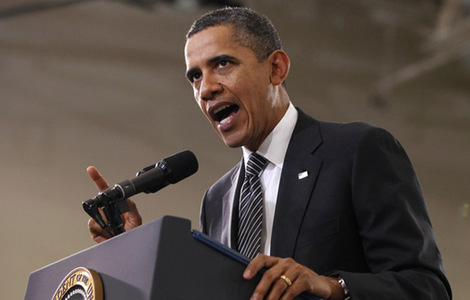Closer Sino-US economic ties boon to global recovery
Updated: 2012-02-12 15:03
(Xinhua)
|
|||||||||
WASHINGTON - Against the backdrop of an intertwined global economy and eurozone debt crisis risks, experts believed that deepening economic ties between the United States and China is critical to the prosperity of both sides and global economic recovery.
Broad common interests
During his US visit in January 2011, Chinese President Hu Jintao said that "under the current circumstances, our two countries have broader common interests, shoulder higher common responsibilities, and face more severe common challenges than at any time in history."
Fostering 21st century economic and foreign policy ties with China was a "defining global strategic issue" for the United States, the US-China Business Council (USCBC), a leading bilateral business organization, said in a report.
Carla Hills, former US trade representative of the Bush administration, said: "We have enormous needs on both sides for mutual understanding. Most of the big issues we face require efforts on both sides."
"We ought to be working together" on a broad range of areas confronting the global community including rebalancing world economy, fiscal sustainability of the United States, climate change, environment, nuclear proliferation and others, Hills said in a recent interview.
According to figures of China's Ministry of Commerce, trade between China and the United States has made strides in the past years. China's trade with the United States, the country's second largest trade partner, rose to 446.7 billion US dollars in 2011, a 16-percent growth over 2010 and a sharp increase from the $80.5 billion 10 years ago.
US Vice-President Joe Biden last year pointed out that trade between his country and China supported more than 500,000 jobs in America in 2010, a boost to reduce high unemployment.
Deep integration
US Treasury Secretary Timothy Geithner used a Chinese proverb "share fortunes together, meet challenges together" at the opening session of the third round of the China-US Strategic and Economic Dialogue (S&ED) in May last year to call for closer cooperation.
Experts said interdependence between the world's largest developed economy and largest developing country has grown exponentially, and a long list of global challenges could not be tackled without commitment and collaboration of the two nations.
"If one of us sits out, it won't be done," Hills stressed, adding that it was "absolutely imperative" for the world's two largest economies to sit down for deep discussion and policy coordination, as the two economies are closely entwined with each other.
"I am a great believer that if you talk long enough, you will find solutions agreeable to both sides," Hills added.
China is currently the third largest exporting market for the United States. China's imports from the United States surged to 122 billion US dollars in 2011, up 19.6 percent from a year earlier, despite the faltering global economy.
Moreover, US companies continued to experience healthy market growth in China. Nearly 10 percent of respondents reported double-digit revenue growth in 2010, and more than 40 percent had revenue growth of more than 20 percent, USCBC President John Frisbie said in releasing the agency's 2011 China Business Environment Survey Results.
The two countries have pledged to promote economic cooperation, build a comprehensive and mutually beneficial economic partnership, and foster open and fair investment environments, according to the China-US comprehensive framework for promoting strong, sustainable, and balanced economic growth and cooperation which was inked during the S&ED last year.
Related Stories
Sino-US ties can lead world in right direction 2012-02-10 13:56
Diplomat: Sino-US ties not a 'zero-sum game' 2012-01-20 19:05
2012, a bumpy year ahead for Sino-US ties 2012-01-04 14:30
Sino-US exchanges build basis for stronger ties 2011-12-20 16:24
'Politicizing trade issues only harm Sino-US ties' 2011-10-14 21:19
US, China to build closer economic ties: Geithner 2011-05-10 06:38
Hot Topics
Kim Jong-il, Mengniu, train crash probe, Vaclav Havel, New Year, coast guard death, Internet security, Mekong River, Strait of Hormuz, economic work conference
Editor's Picks

|

|

|

|

|

|







